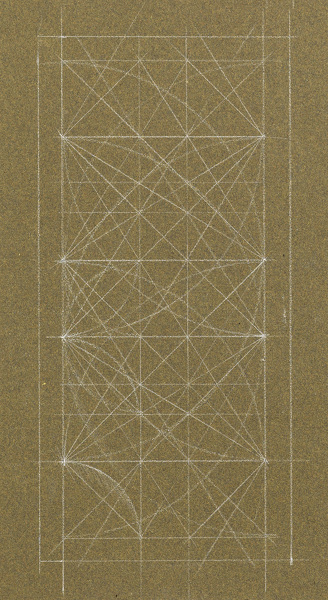
Design inspired by Clematis Montana, circa 1960
Unmounted (ref: 5724)
White chalk on brown paper
12 x 6 5/8 in. (30.5 x 17 cm.)
Tags: Sir Thomas Monnington chalk design

Tags: Sir Thomas Monnington chalk design
Provenance: Lady Monnington; John Monnington
Exhibited: Paul Liss, Thomas Monnington, The Fine Art Society 1997, no. 150.
Literature:
Paul Liss, Thomas Monnington, The Fine Art Society 1997, p. 57; British
Murals and Decorative Painting 1920-1960, Sansom
& Co, 2013, p.321
In late 1950's Monnington embarked on a series of assymetrical designs which were inspired by a Clematis Montana growing at Leyswood. My interest in abstract is in trying to do something more than imitate, Monnington explained in an interview for the Church Times, (30 December 1966): I think it is possible that, through a more abstract approach, one can get nearer to the underlying nature of reality. A
still life entitled Clematis - exhibited at the Royal Academy in 1959
(34) - was possibly the point of departure for this more abstract
interpretation. This work is closely related to the ceiling of the Mary
Harris Memorial Chapel in its colour and construction. Bristol and
Exeter were undoubtedly instrumental in Monningtons pursuit of
‘Geometric’ paintings (a term he preferred to Abstracts). When the Tate
purchased Monnington’s Square Design (1967) he spoke of his abstract
paintings as “direct descendants from
my ceiling painting in the Council House, Bristol, which was my first
departure from purely representational painting. Since them I have been
increasingly interested in the subdivisions of surface areas contained
in equilateral rectangels (squares) and rectangles derived from square
roots. These two-dimensional mathematical relationships suggest to me
dimensions in depth, and provide a discipline which at the present time I
find as necessary and interesting as that imposed previously in
representational painting... You can cut out the blurb if you wish, but I
was trying for my own edification to put into words what I think I have
been trying to do in the last ten years”, (letter of 12th June 1968)
